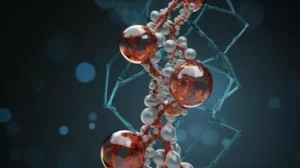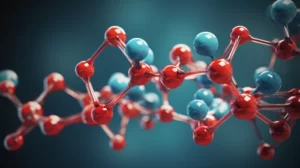Anti-aging medicine is evolving quickly, and living a longer, healthier life without chronic diseases like cancer, heart disease, and dementia has become a main priority. Research into how diet, lifestyle, environment, and other elements, is shedding light on how these factors play key roles in the aging process. We know that aging is a complex process influenced by pathways such as inflammatory responses, mitochondrial function, and genetic expressions.
Epigenetics Holds the Key
One exciting area of research is the fast-growing field of epigenetics which shows that our genes can behave differently depending on external factors such as diet, exercise, stress levels, environment, and many other influences. This means we have much more control over our genetic destiny than previously thought.
Researchers have discovered that reducing the number of calories an animal eats can help it live longer and healthier. A breakthrough in research has found that resveratrol, a potent antioxidant derived from sources like red grapes and wine, can interact with the SIRT-1 gene to delay aging in humans.
The Telomere Debate
At the end of each chromosome, short DNA sequences called telomeres help protect our genetic material. However, with each cell division, telomeres get shorter, reducing their ability to preserve our chromosomes. In time, telomeres fail, chromosomes degrade, and cells can no longer divide, leading to cell death.
Various natural health measures can help protect telomere length; having a regular meditation practice, eating nutrient-dense unprocessed foods, and drinking green tea have all been linked to longer telomeres. Chronic stress, toxins, and even eating preserved meats have all been associated with shorter telomeres.
Supporting Mitochondrial Health
Supporting mitochondrial health may help deal with stressed telomeres. There are a number of natural ways to boost mitochondrial function and help combat aging such as:
- Taking CoQ10, a powerful antioxidant that helps control oxidative stress.
- Consuming PQQ (pyrroloquinoline), which is found in foods like Natto, parsley, and green tea.
- Taking L-Carnitine, essential for mitochondria to get enough fuel to produce ATP.
- Consuming alpha-lipoic acid, which also supports mitochondria.
- Consuming certain medicinal mushrooms, particularly cordyceps and reishi.
Controlling Inflammation
Chronic inflammation accelerates aging and is present in every aging-related disease like cardiovascular disease, cancer, dementia, diabetes, and arthritis. Researchers are finding that controlling the protein HMGB1 can help us fight chronic inflammation. Mung beans and green tea have been shown to control HMGB1.
Strategies for Optimal Cellular Health
By taking measures to reduce inflammation, support mitochondrial health, and promote healthy genetic expression, we’re directly supporting the health of our cells. Therefore, my recommendations for healthy aging include:
- Detoxify your body by consuming a healthy diet.
- Supplement with Modified Citrus Pectin (MCP), which reduces chronic inflammation and fibrosis.
- Exercise gently and regularly.
- Adopt a stress management program such as regular meditation.
Now that we have a greater understanding of our complex cellular and genetic functions and how they relate to aging, we can adopt specific foods, nutrients, and lifestyle practices to help address overall wellness and longevity, delivering greater vitality into our golden years and beyond.



